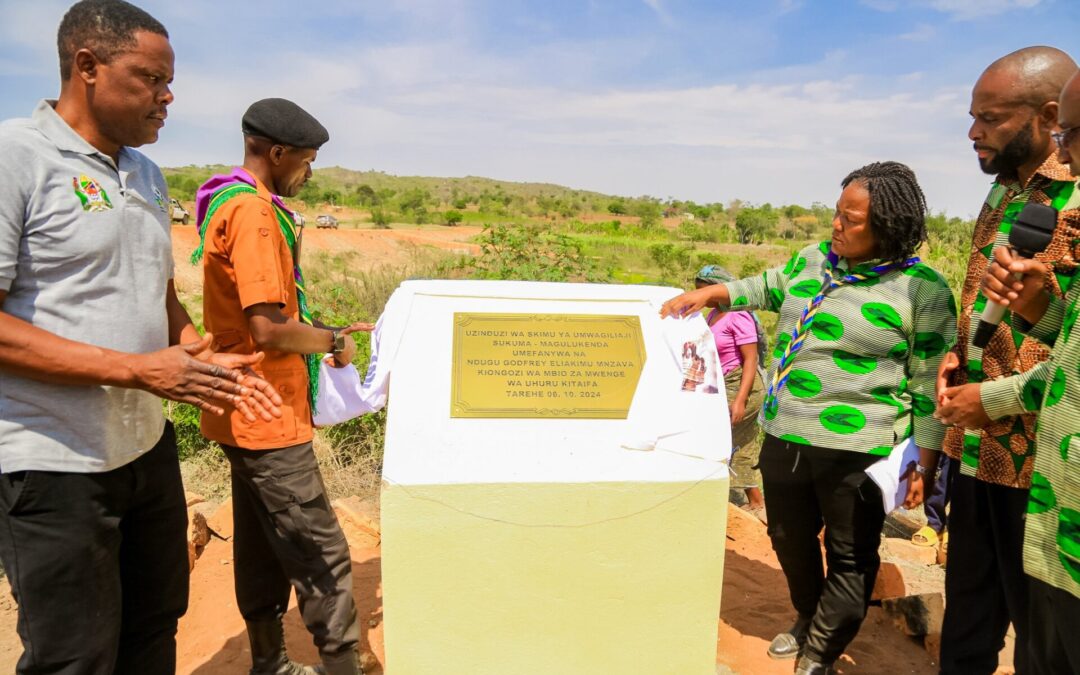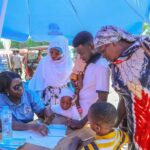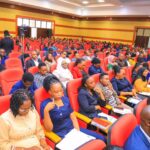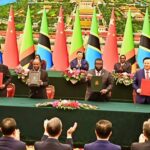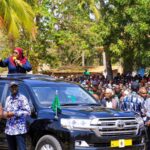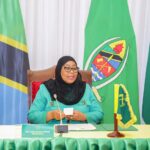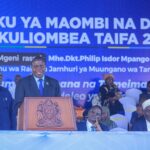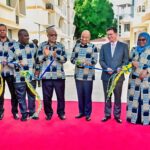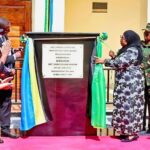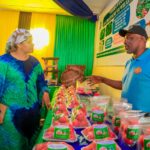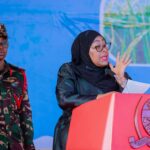Inauguration of Irrigation Scheme Project in Sukuma
On 6 October 2024, Comrade Godfrey Eliakim Mnzava, the National Leader of Tanzania’s Torch of Freedom race, officially launched an irrigation scheme project in Sukuma, Buchosa District. The project was constructed with a budget of Tshs. 2.4 billion, funded by the National Irrigation Commission.

The inauguration of the irrigation scheme project in Sukuma, Buchosa District, represents a significant milestone for the region.
Project Overview
- Inauguration Date: October 6, 2024
- Inaugurated By: Comrade Godfrey Eliakim Mnzava, National Leader of Tanzania’s Torch of Freedom race
- Location: Sukuma, Buchosa District
- Budget: Tshs. 2.4 billion
- Funding Source: National Irrigation Commission
Objectives and Benefits
The primary objective of the irrigation scheme is to enhance agricultural productivity by providing a reliable water supply to local farmers. It is anticipated that this project will:
The project will lead to increased crop yields. By guaranteeing a reliable water supply, farmers can cultivate their crops more efficiently, resulting in increased yields and enhanced food security.
The project will also stimulate economic growth. Enhanced agricultural productivity will contribute to the local economy, creating employment opportunities and increasing incomes for farmers and related businesses.



The project will also promote sustainable farming practices. The irrigation system will facilitate the adoption of sustainable farming practices, reducing reliance on rain-fed agriculture and mitigating the effects of climate change.
Community Impact
It is anticipated that the project will have a transformative effect on the local community, as follows:
The project will enhance the quality of life for local residents by improving livelihoods. The provision of improved access to water will enable farmers to diversify their crops and increase their production, thereby enhancing their livelihoods.
The project will enhance food security. The increased agricultural output will guarantee a stable food supply for the region, thereby reducing the risk of food shortages.
The project will also facilitate regional development. The project is aligned with broader regional development initiatives, contributing to the overall growth and prosperity of the Buchosa District.
Future Prospects
The successful implementation of this irrigation scheme paves the way for similar projects across Tanzania. This project exemplifies the government’s dedication to investing in infrastructure that fosters sustainable development and enhances the quality of life for its citizens.
Torch of Freedom Handover and Regional Development Initiatives
On 6 October 2024, the Mwanza Regional Head, Hon. Said Mtanda, received the Torch of Freedom from the Geita Region. This symbolic handover marks the commencement of a pivotal phase of regional development initiatives, designed to enhance infrastructure and improve quality of life for residents in the Mwanza region. Hon. Mtanda will undertake a comprehensive tour of the region, during which he will visit, inspect, lay foundation stones for and launch a total of 58 development projects.





The combined value of these initiatives is in excess of 98 billion Tshs.
Comprehensive Tour and Project Launches
Hon. Said Mtanda is set to embark on an extensive tour across the region to:
- Visit and Inspect Projects: Ensuring that ongoing projects meet the required standards and are progressing as planned.
- Lay Foundation Stones: Officially commencing new projects that are crucial for regional development.
- Launch Development Projects: Inaugurating completed projects to make them operational and beneficial to the community.
Key Development Projects
The 58 development projects, representing an investment of over 98 billion Tshs, cover a wide range of sectors, including:
- Infrastructure: Construction and improvement of roads, bridges, and public transportation systems to enhance connectivity and accessibility.
- Education: Building and upgrading schools and educational facilities to provide better learning environments for students.
- Healthcare: Establishing new healthcare centers and upgrading existing ones to improve access to medical services.
- Agriculture: Implementing agricultural projects to boost productivity, support farmers, and ensure food security.
- Water and Sanitation: Developing water supply systems and sanitation facilities to improve public health and hygiene.
Impact on the Community
These initiatives are expected to have a profound impact on the Mwanza region by:
- Creating Jobs: Generating employment opportunities during the construction and operational phases of the projects.
- Enhancing Quality of Life: Providing essential services and infrastructure that improve living standards for residents.
- Promoting Economic Growth: Stimulating local economies through improved infrastructure and increased agricultural productivity.
- Fostering Sustainable Development: Ensuring that development projects are environmentally sustainable and beneficial for future generations.
Commitment to Regional Growth
The Torch of Freedom handover and the subsequent development initiatives demonstrate the Tanzanian government’s commitment to regional growth and sustainable development. The government’s investment in these projects is designed to create a more prosperous and resilient future for the Mwanza region and its people.
Tanzania’s Commitment to Sustainable Development
Tanzania’s commitment to sustainable development is demonstrated by its strategic investment approach and comprehensive policies designed to drive regional growth and enhance the quality of life for its citizens.





The following aspects illustrate this commitment in greater detail:
Infrastructure Development
The Tanzanian government is making significant investments in infrastructure projects with the objective of enhancing connectivity and accessibility across the country. The projects in question are as follows:
- Roads and Bridges: Construction and rehabilitation of roads and bridges to improve transportation networks, reduce travel time, and facilitate trade.
- Public Transportation: Development of efficient public transportation systems to reduce congestion and promote sustainable urban mobility.
- Energy: Expansion of the national grid and promotion of renewable energy sources to ensure reliable and sustainable energy supply.
Agricultural Advancements
Agriculture remains a key contributor to Tanzania’s economy, and the government is committed to supporting this sector through:
- Irrigation Projects: Implementing irrigation schemes to increase agricultural productivity and ensure food security.
- Support for Farmers: Providing training, resources, and financial support to farmers to adopt modern farming techniques and improve yields.
- Sustainable Practices: Encouraging sustainable farming practices to protect the environment and enhance resilience to climate change.
Education and Healthcare
Tanzania has identified improving access to quality education and healthcare as a key priority, with a number of initiatives already underway including:
- School Construction and Upgrades: Building new schools and upgrading existing ones to provide better learning environments.
- Healthcare Facilities: Establishing new healthcare centers and upgrading hospitals to improve access to medical services and enhance public health.
- Training Programs: Investing in training programs for teachers and healthcare professionals to ensure high standards of education and medical care.
Environmental Sustainability
Tanzania is dedicated to the protection of its natural resources and the advancement of environmental sustainability through the implementation of a comprehensive strategy:
- Conservation Efforts: Implementing policies and programs to conserve wildlife and natural habitats.
- Renewable Energy: Promoting the use of renewable energy sources such as solar, wind, and hydroelectric power.
- Climate Action: Developing strategies to mitigate the impacts of climate change and enhance resilience, including reforestation and sustainable land management practices.
Community Empowerment
The government is committed to fostering community empowerment through the following initiatives:
- Economic Opportunities: Creating jobs and supporting small businesses to stimulate local economies.
- Social Services: Enhancing access to social services such as clean water, sanitation, and housing.
- Inclusive Development: Ensuring that development initiatives are inclusive and benefit all segments of society, particularly women and youth.
In conclusion, Tanzania’s dedication to sustainable development is evident in its multifaceted strategy to enhance infrastructure, bolster agriculture, elevate education and healthcare standards, advance environmental sustainability, and empower communities. These initiatives are designed to create a resilient and prosperous future for all Tanzanians.
Tanzania Media
- Tanga Football Extravaganza: TDFA Odo Ummy Cup 2024/25 - 19 November 2024
- Water Sector Reforms in Tanga: A Leap Towards Sustainable Development - 19 November 2024
- Tragedy in Kariakoo: A Nation’s Response to a Building Collapse - 19 November 2024

